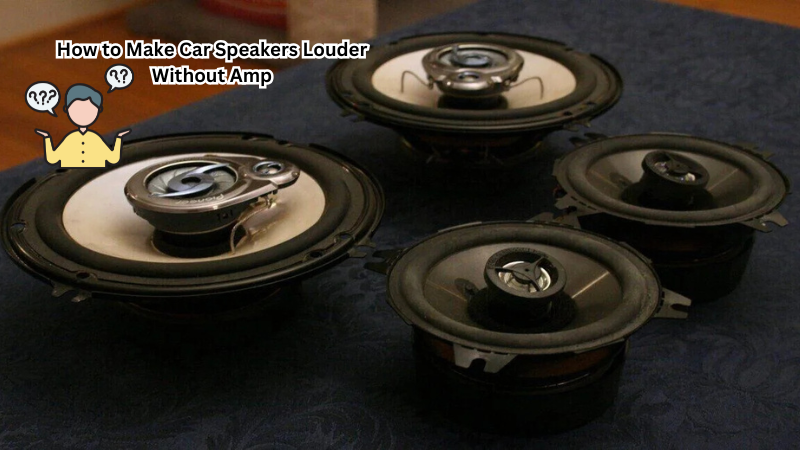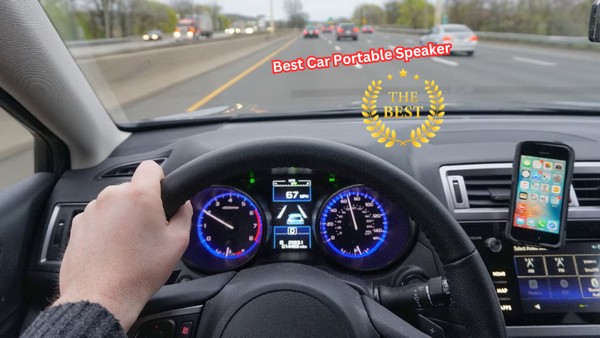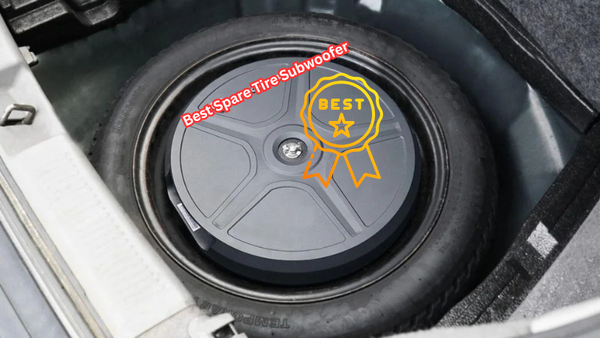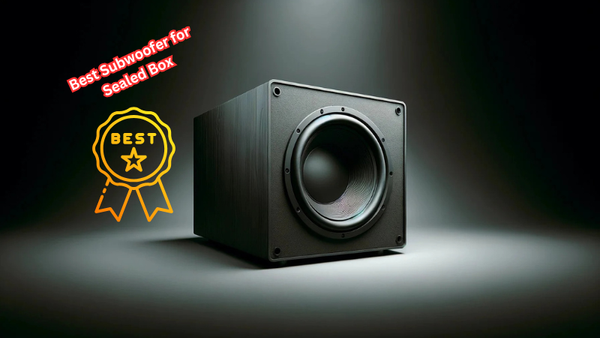For many car audio enthusiasts, achieving a louder and clearer sound system is a top priority. Typically, amplifiers are seen as essential tools for boosting speaker volume, but they aren't the only solution. If you're looking to enhance your car's audio experience without the expense and complexity of an amplifier, you're in the right place.
This blog post explores alternative, cost-effective methods to make your car speakers louder. From optimizing speaker placement to using soundproofing materials, these simple yet effective strategies can transform your listening experience.
Not only are these tips budget-friendly, but they also require minimal technical skills, making them accessible to any car owner eager for better sound quality.
What Are the Benefits of Having Louder Car Speakers?
Before diving into how to make your car speakers louder, let's first understand why it's desirable. Having powerful audio in your vehicle offers several advantages, including:
- Enhanced clarity: With increased volume comes better sound quality and a more immersive listening experience.
- Better bass response: Louder speakers can produce deeper and richer bass tones, adding depth to your music.
- Overcoming road noise: When driving at high speeds or on noisy roads, it can be challenging to hear music. Louder speakers help overcome external noise interference, allowing you to enjoy your music without any distractions.
- More enjoyable group drives: Whether you're heading out for a road trip with friends or simply carpooling, having louder speakers can make the journey more enjoyable for everyone.
- Improved resale value: If you ever decide to sell your car, having powerful and well-maintained audio components can increase its overall value.
Now that we've established the benefits of having louder car speakers, let's explore how to achieve it without an amp.
What Are the Reasons for Low Speaker Volume?
There can be several reasons for low speaker volume in a car. One of the most common is poor placement. Speakers should ideally be placed at equal distances from the listener to achieve balanced sound distribution. If they are not positioned correctly, you may experience lower volume levels from certain speakers.
Another reason could be outdated or damaged speakers. Over time, car speakers can wear out due to exposure to elements such as dust, moisture, and extreme temperatures. This can result in reduced sound output and overall quality.
Additionally, your car's audio system settings may also impact speaker volume. Check if there are any presets that limit volume levels or if the balance and fader settings need adjustment.
Lastly, external noise interference can also play a role in lower speaker volume. This could be due to road noise, wind noise, or even engine sounds that compete with the audio coming from your speakers.
It's essential to pinpoint the root cause of low speaker volume before attempting any solutions. This will ensure that you address the issue correctly and effectively improve your car's sound system.
How to Make Car Speakers Louder Without an Amp
Now that we've covered the potential reasons for low speaker volume, let's explore how to make your car speakers louder without an amp.
1. Optimize Speaker Placement
As mentioned earlier, poor speaker placement can result in imbalanced sound distribution and lower volume levels from certain speakers. To optimize your speaker placement, ensure that they are positioned at equal distances from the listener. If your car has a stereo system, place each set of speakers on opposite sides of the car.
Another tip is to avoid placing speakers too close to walls or corners as this can cause sound reflections and distortions. Experiment with different placements until you find the optimal position for each speaker.
2. Use Soundproofing Materials
One way to increase speaker volume is by reducing external noise interference. This can be achieved by using soundproofing materials, such as foam or rubber mats, to line the inside of your car doors and other areas where speakers are installed.
These materials help absorb external noise and prevent it from interfering with your music. They also improve overall acoustic quality, resulting in a clearer and louder sound from your speakers.
3. Upgrade Your Speakers
If you're still using stock speakers that came with your car, consider upgrading to aftermarket ones. These are often designed with better materials and technology for improved sound performance.
When choosing new speakers, look for those with higher power handling capabilities and sensitivity ratings. These features will allow your speakers to produce louder and clearer sound without an amplifier.
4. Use a Sound Enhancer or Equalizer
Some modern car audio systems come with built-in sound enhancers or equalizers that can boost speaker volume. These tools allow you to adjust frequency levels and other settings to optimize audio output.
If your car doesn't have these features, you can purchase external sound enhancers or equalizers to connect your head unit and speakers. This is a more affordable alternative to buying an amp but can still significantly improve the volume and overall quality of your speakers.
5. Check Wiring and Connections
Sometimes, low speaker volume can be caused by faulty wiring or loose connections. Check all the wiring and connections for any damage or looseness and make sure they are securely connected.
Also, ensure that your speakers are receiving enough power from the head unit. If not, consider upgrading to a higher-powered head unit to increase speaker volume.
6. Adjust Audio Settings
As mentioned earlier, your car's audio settings can impact speaker volume. Make sure to check if there are any preset limits on volume levels or if the balance and fader need adjusting.
Adjusting these settings may also help fix any imbalances in sound distribution between speakers, resulting in a louder overall output.
7. Use an Amplified Subwoofer
If you're looking for a significant boost in bass tones, consider installing an amplified subwoofer. These are designed to produce deeper and richer bass tones without requiring an external amplifier.
They can be easily installed and connected to your car's audio system, providing a quick and effective solution for increasing overall volume levels.
8. Keep Your Speakers Clean
Lastly, make sure to regularly clean your speakers to maintain their optimal performance. Dust and debris can build up on speaker cones and affect sound output over time.
Use a soft cloth or brush to gently remove any dust or dirt from your speakers, ensuring they continue to produce clear and loud sounds.
These are some ways to make your car speakers louder without an amp. Remember, before attempting any of these solutions, it's important to identify the root cause of low speaker volume and address it accordingly.
How to Maintain Loud Speakers
Once you've successfully increased the volume of your car speakers, it's essential to maintain them for long-lasting performance. Here are some tips on how to keep your speakers loud and clear:
- Regularly clean your speakers to prevent dust and debris buildup.
- Avoid exposing your car speakers to extreme temperatures and moisture.
- Be mindful of the volume levels you listen at, as excessively high volumes can damage your speakers over time.
- Check connections regularly and make sure they are secure and free from any damage.
- If you notice any distortion or decrease in sound quality, troubleshoot the issue immediately to prevent further damage.
By following these maintenance tips, you can ensure that your car speakers continue to produce loud and clear audio for your enjoyment.
Additional Tips for Improved Sound Quality
Aside from increasing speaker volume, there are other ways to enhance the overall sound quality of your car's audio system. Here are a few additional tips:
- Use high-quality audio files or streaming services for better sound output.
- Adjust the sound settings based on the type of music you're listening to (e.g., bass-heavy songs may require lower treble levels).
- Consider installing a dedicated power amplifier if you want to significantly increase speaker volume and overall sound quality.
- Regularly tune your car's audio system for optimal performance.
FAQs
How do I know if my car speakers need replacing?
If you notice a significant decrease in sound quality or loudness from your car speakers even after trying various troubleshooting techniques, it may be time to replace them with newer ones.
Can I install an amplifier with my stock car speakers?
Yes, you can install an amplifier with your stock car speakers. However, keep in mind that doing so may not significantly increase volume levels as the speakers were not designed to handle high power inputs. It's best to upgrade your speakers before adding an external amplifier for optimal results.
What is the average lifespan of car speakers?
The lifespan of car speakers can vary depending on factors such as usage, maintenance, and quality of materials. On average, however, car speakers can last anywhere from 5-10 years.
Conclusion
Enhancing your car audio system without an amplifier is not only feasible but also straightforward with the right approach.
By optimizing speaker placement, utilizing soundproofing materials, adjusting your audio settings, and considering component upgrades, you can significantly boost your car speakers' volume. These strategies are effective and user-friendly, making them accessible to any car owner eager to experience better sound quality without the need for complex equipment.
We encourage you to try these methods and experiment with various combinations to discover what works best for your vehicle. Share your experiences and any additional tips in the comments—your insights could help fellow audio enthusiasts enhance their sound systems too.





